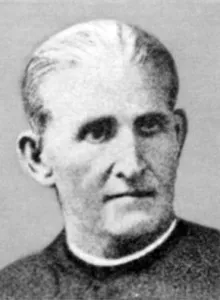
Priest of the UGCC, Ukrainian composer and music theorist, famous Galician musician, folklorist, and writer. A student of Mykhailo Verbytskyi. Father of Olga-Olexandra Bazhanska-Ozarkevych.
Biography.
He was born on February 22 or 24, 1836, in the village of Beleluia, now Sniatyn district, Ivano-Frankivsk region, Ukraine (then Sniatyn district, Kingdom of Galicia and Volhynia, Austria-Hungary).
From 1846 to 1856 he studied at the gymnasium of the monastery of St. Basil in Buchach, and at the gymnasiums of Stanislav (now Ivano-Frankivsk) and Chernivtsi. He graduated from the Lviv Theological Seminary (1865). He studied music privately with S. Vorobkevych, I. Lavrivskyi, and I. Hunevych. He was a music teacher in Lviv (1863-1871).
In 1871-1920, he was a parish priest in the village of Soroky (now Soroky-Lvivski) and in Zhabie (now Verkhovyna village, Ivano-Frankivsk region).
Creative work
Along with his own recordings, he published more than 4 thousand Ukrainian folk melodies recorded by other collectors of folklore from Galicia: "Ruthenian folk melodies of Galicia" (Lviv, 1905-1912, 10 editions).
Author of works published in Lviv: "History of the Russian Church Chant" (1890), "Russian Folk Poetic and Musical Rhythm," "Malorussian Musical Folk Tone" (both 1891), "Malorussian Folk Melody" (1892), "Russian Folk Musical Harmony." "Russian Folk Musical Opera" (both 1900), "The Purpose and Structure of Ancient Musical Harmony", "A New Method of Recording Russian Folk Melody" (both 1904), "Russian Folk Musical Style" (part. 1, 1907; part 2, 1911), "Russian Folk Naturalistic Music" (1913), and the manual "Complete Instrumentation of European and Russian Folk Instruments" (1914).
He is the author of the melodramas Dovbush, Olesia, The Wedding, Marichka - a Tatar Prisoner from Pokuttya, and other musical works. He worked for the Russian People's Theater. On April 23, 1891, the premiere of the opera "Marichka - a Tatar captive from Pokuttya" (1889) took place in Ternopil.
Together with A. Vakhnyanyn, he compiled the first collection of works by Ukrainian composers in Galicia "Kobzar" (male vocals, quartets; 1885). He wrote operettas based on his own librettos: "Paranya", "Sibiryachka", "Susanna", "Nima", "Syritka", "Marusya" (1870-1911, Lviv); music to the plays "The Late Opanas" by Y. Yankovsky (1869), "Hnat Prybuda" by S. Vorobkevych, "Olesia" (1883), "Mariika" (1891), "Halia" by P. Sventsitsky; orchestral choral works (4 liturgies; 2-4 - 1907-1911). Bazhansky's operas were in the repertoire of the Ruska Besida Theater in the 1870s and 1890s.
Porfirij Bazhansky was an outstanding beekeeper, the inventor of a beehive of his own design, and introduced a new method of bee swarming that allowed him to significantly increase honey collection. He published his experiments and observations in the journal Bartnik postepowy, which was published in Lviv. He also wrote a number of books: "Beekeeper's Calendar" (Lviv, 1877; 1879), "The Nature and Life of Bees" (B.m., b.r.), "A New Mistress in a Honey Paddock" (Lviv, 1902; 1912), "Honey Plants" (Lviv, 1881).
In 1986, a memorial sign was unveiled in the village of Beleluia.
He was buried in the family tomb on the 59th field of Lychakiv Cemetery.

